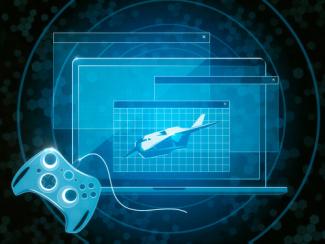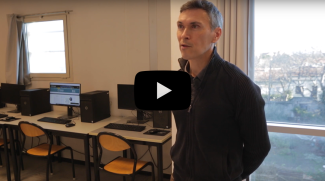The Computer Science degree is a national diploma whose objective is to train general computer scientists. They participate in the design, development and implementation of IT solutions. The Aix site prepares students more specifically for the job of "fullstack developer", as well as for the administration and security of communicating computer systems. The computer scientists who graduate from this program have both practical and theoretical skills that allow them to consider immediate professional integration or further studies.

-
How are the studies organized?
Spread over 3 years, the training represents 2000 supervised hours, to which are added 600 hours of tutored projects and at least 22 to 26 weeks of internship and/or work experience. Part of the B.U.T. curriculum INFORMATICS program in Arles can be done in a work-study program. However, it will be possible to obtain a diploma at the baccalaureate + 2 level; students who make this choice, in order to enter the job market or continue their studies, will then obtain the DUT INFORMATICS.
The following course is offered at the Computer Science Department of the IUT site of Arles :
Application development: design, development, validationThis course requires academic and professional skills and know-how, organized around the development of the six major skills that characterize the B.U.T. Computer science :
- Carry out an application development
- Optimize computer solutions
- Administering complex communicating computer systems
- Manage information data
- Lead a project
- Work in an IT team
This course is based on the consolidation of the "Optimizing IT solutions" skill.
A diploma at Bac + 2 will remain possible via the D.U.T Informatique. -
Internships, work-study and supervised projects
- The training is carried out either in initial training or in alternating training from the third year.
- The University Bachelor of Technology is divided into 6 semesters.
- The program: 2000 hours + 600 hours of tutored project spread over the 3 years with a maximum of 32 hours of classes per week.
- Internship periods of 22 to 26 weeks.
-
Alternance
En BUT Informatique, l'alternance est possible mais facultative en 3ème année.
Consultez le calendrier d'alternance (bientôt en ligne dans la rubrique info pratique ci-dessous)
L'alternance en BUT INFO BUT 1, 2 et 3 BUT 2 et 3 BUT 3 Parcours REAL non non possible : contrat 1 an -
International mobility
1 or 2 semesters abroad, or internship.
-
Certifications
Certifications offered: PIX, TOEIC, Voltaire
Application development: design, development, validation
-
Objectifs du parcours
Ce parcours forme des cadres intermédiaires capables :
– de développer des applications complexes, c’est-à-dire recueillir et analyser les besoins du client, développer ou adapter une application complexe de qualité, réaliser la maintenance ou le suivi de cette application ;
– de mettre en place des jeux de tests, c’est-à-dire construire des jeux d’essais, automatiser leur exécution et assurer l’intégration continue.En outre, la personne titulaire du B.U.T. Informatique parcours Réalisation d’applications : conception, développement, validation dispose de compétences en matière de raisonnement et de modélisation mathématiques, en droit, économie et gestion des entreprises et des administrations, en expression-communication et en langue anglaise.
Activités préparées par le parcours
Le développement d’application consiste à recueillir les besoins des clients, analyser ces besoins, concevoir et réaliser une implémentation répondant au cahier des charges, dans des contextes qui peuvent être spécialisés en fonction de domaines métiers (gestion, finance, santé, jeux vidéos,...) ou des plateformes de développement spécifiques (web, mobile, desktop, IoT...). Le développeur peut accéder à des métiers plus spécialisés : développement web, développement mobile, développement frontend, développement fullstack, développement backend, architecte logiciel, lead developer, DevOps. Le développement doit suivre l’état de l’art en matière de processus qualité, de sécurité et d’efficacité (temps de calcul, green computing), ce qui nécessite le développement de compétences variées. Les équipes de développement pouvant être de taille conséquente, il est nécessaire d’être formé aux diverses techniques de travail en équipe usuelles dans le domaine.
Les métiers de testeurs correspondent à l’intégration d’applications, leur déploiement et la conception et réalisation de tests visant à en assurer la qualité. Ces métiers en plein essor permettent de faire le lien entre les exigences métiers spécifiques à un domaine et la partie développement explicitée plus haut. Les tests peuvent concerner les tests utilisateur, les tests fonctionnels, la non-régression. -
Skills
The Applications Realization: Design, Development, Validation course is based on a reinforcement of the "Administering complex communicating computer systems" skill.
-
Materials
-
Trades
At the end of the training, the following jobs are accessible: Application Designer-Developer, Tester, Tech Lead, System and Network Developer and Administrator, Web Developer and Integrator, Database Specialist...
-
Further studies
- At the end of the first two years and after obtaining the D.U.T., students can go on to professional licenses, general licenses, and possibly engineering schools...
- At the end of the three years and after obtaining the B.U.T., students can go on to Masters in computer science, MIAGE, public (ENSIMAG, UTC, INSA, POLYTECH...) or private engineering schools, but also through training abroad.
Application
To know the selection criteria of candidates on Parcoursup, consult the Parcoursup recruitment report of the previous year for INFORMATIQUE
Application
- Holder of the baccalaureate general and scientific coloration (at least 1 speciality among Math, Numerical and Computer Sciences, Engineering Sciences, Physics Chemistry)
- Holder of the baccalaureate of technological pathway STI2D
PRACTICAL INFORMATION
Address : Rue Raoul Follereau - 13200 Arles






